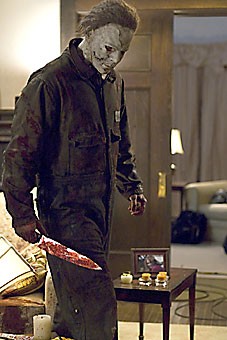Sex will kill you.
In addition to a diatribe by a sex-ed teacher from Hell, the above statement is also one of the many “”rules”” of horror films. The other ones are: never go up the stairs, never investigate a strange noise, never drink or do drugs and never say, “”I’ll be right back.””
This past weekend saw the release of two horror-related films: the “”Halloween”” remake, directed by Rob Zombie, and the revenge movie “”Death Sentence,”” (starring Kevin Bacon) from the director of “”Saw.””
While not even remotely out of the ordinary, the release of these two films on the same day prompted my overly analytical (and slightly neurotic) mind to wonder: why, after so many remakes and so many dumb kids getting strangled by phone cords, do audiences still flock to see horror films?
Horror is possibly one of the broadest and most complicated of all film genres: there are zombie horror films, creature horror films, biological/virus horror films, the very common slasher horror films and the most recent addition to the group, “”torture porn”” horror films (a la the “”Hostel”” and “”Saw”” series). Furthermore, the genre is one of the only ones that actually has its own set of rules.
While this may not seem all that earth-shattering, it is definitely worth examining: what is it about these particular types of films that can account for their continued prevalence in modern-day cinema? Is it the superb acting performances? The compelling stories? The breathtaking cinematography? Witty dialogue?
Possibly. But Kyle Bishop, a second-year graduate student in English literature and overall horror film expert, believes the success of horror films can be attributed to something much deeper: the hidden fears inside all of us.
“”Monsters (serial killers, zombies, etc) are almost always used as a trope for our own monstrosities and fears – usually those associated with death and sex. Most horror films address violence, vulnerability, and the failure of science or society to provide security,”” Bishop said.
He also makes an interesting observation: the correlation between societal events and the popularity of horror films. “”Horror movie cycles always peak and flourish when the country is at war or feeling the paranoia associated with war and/or terror. They are escapist and cathartic, and like all great entertainment, they prosper when people need the chance to forget their own fears and woes – see the 1930s, 1950s, 1970s, and 2000s.””
The Great Depression, the Cold War, the Vietnam War and the current political quagmire in Iraq: it all makes sense. It should have been obvious, since escaping reality is possibly one of the biggest appeals of movies to begin with. We are all terrified of the world around us, but since we are usually powerless to stop things from happening, we instead resort to seeing our fears played out on film – no matter how perverse and twisted they might be.
Therefore, it doesn’t matter that we already know what’s going to happen in the scary movie – what matters is that it’s not happening to us.
For example, most people are aware of the plot of “”Halloween”” even if they haven’t seen the original. There’s a man – Michael Myers – in a big white mask who likes to kill people, particularly sexually active teenagers. At the end, the virgin lives and you think the killer is dead, but of course he isn’t because then there wouldn’t be a sequel.
Considering that Rob Zombie’s remake of the classic 1978 film was No. 1 at the box office last weekend, it is obvious that an imaginative plot is not really essential to fill seats in the theaters.
But it would help.
“”Halloween”” was really sick and horrific for about the first 40 minutes, when we are shown Myers’ childhood and the origins of his murderous habits. A 10-year-old kid with an angelic face stabbing his sister seventeen times is extremely disturbing.
Then Myers gets taken away to a mental institution and eventually escapes from it. From that point on it’s the same formulaic crap we expect from horror films.
But then again, it’s formulaic crap that many Americans paid to see … damn you, horror movie industry!









